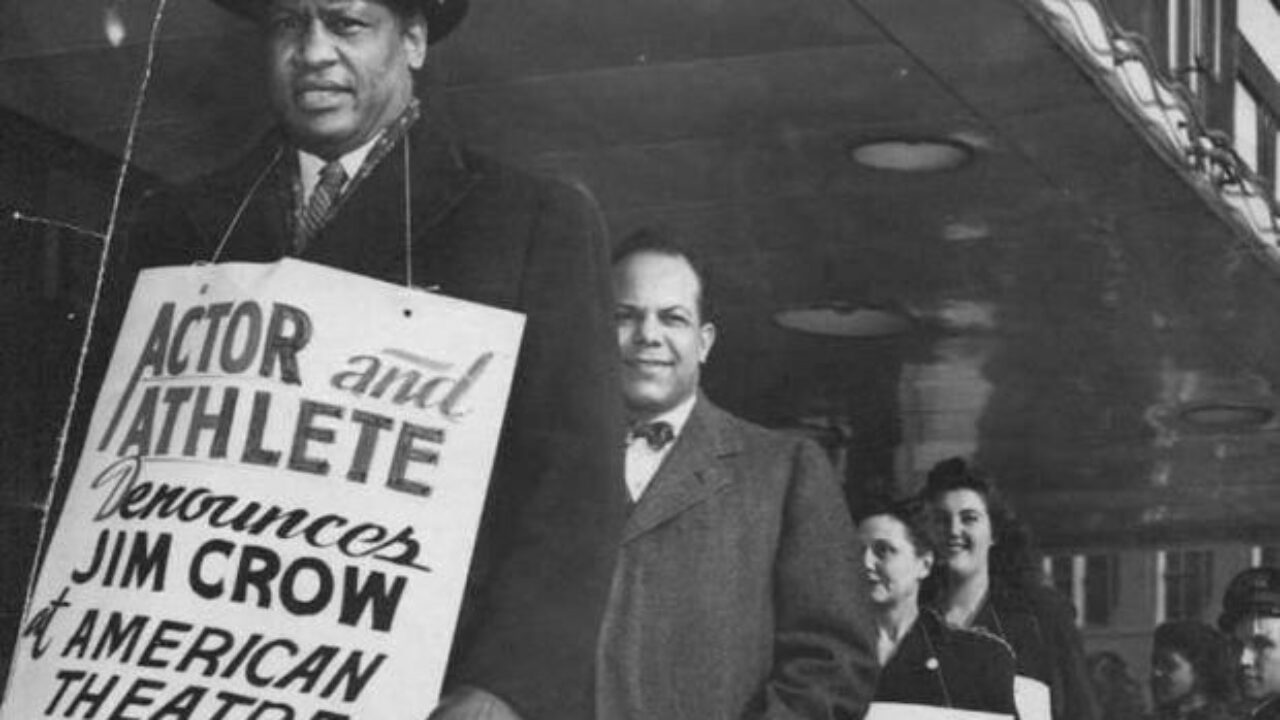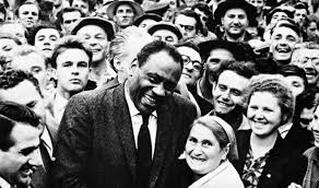|
Archishman Raju Paul Robeson was an artist, singer, philosopher, linguist and political revolutionary. To understand Paul Robeson as a figure, one must not confine him to any narrow aspect of his personality but attempt to understand the whole of his life. In 1935, Robeson had written, “The race which first learns to balance equally the intellectual and the emotional---to use the machines and couple them with life of true intuition and feeling such as the Easterns know--- will produce the supermen.” In some ways, he himself came to become the embodiment of such a superman, a man the likes of which the world has perhaps never seen since. He represented a new kind of human being, who heralded the emerging freedom of the darker peoples of the world.
It is no surprise then that Paul Robeson was a hero to the darker nations and peoples of the world. The names of the people who admired him include Jawaharlal Nehru, Krishna Menon, Indira Gandhi, Kwame Nkrumah, Oliver Tambo, Yusuf Dadoo, Kamaladevi Chattopadhyaya, Mme. Sun Yat Sen, Fidel Castro and many more. The U.S. Government confiscated Paul Robeson’s passport because it did not allow him to travel to the newly independent nations and expose the truth about U.S. society. They practically said as much. It is difficult to find an anti-colonial struggle at that time that Paul Robeson did not actively support and fight for. Paul Robeson was thus a figure who wielded immense moral and political authority in the darker world. Paul Robeson was an early supporter of the Indian struggle for independence. In 1942, as the whole Congress leadership was arrested following the Quit India movement, the Council on African Affairs, which he founded, held a Free India Rally in New York. Paul Robeson spoke at the rally and told the audience of his early friendship with Indian revolutionaries. Jawaharlal Nehru would later say “Paul Robeson is one of the greatest artists of our generation” Similarly, Robeson would support the Chinese Struggle against Imperialism. He became close friends with Liu Liangmo, a Chinese musician and collaborated with him to produce an album of songs, Chee Lai, Songs of New China. This was to become China’s national anthem. Soong Ching Ling, also known as Madame Sun Yat Sen, said Robeson is “the voice of the people of all lands”. Robeson was appointed honorary director of the China Defense League that she founded . Robeson had started the Council on African Affairs in 1937. The task of the Council was “to give concrete help to the struggle of the African masses” and “to smash the iron curtain of secrecy and double talk that surround the schemes for intensified imperialist exploitation of Africa and its people”. A young Kwame Nkrumah would participate in the formulation of the Council’s objectives. The Council held rallies to free Africa as well as worked to combat apartheid in South Africa. Oliver Tambo later called Robeson “a universal idol and a friend dear to all who know him”. Yusuf Dadoo would say Robeson had done “Pioneering work in mobilising World Public opinion against Racism and Colonialism and For Peace”. Robeson participated in a rally denouncing the American intervention in Korea in June, 1950 saying “we may be sure the people of Korea, Indo-China, the Philippenes and Formosa will not treat their invaders lightly any more”, just days before the order would come to confiscate his passport. He later would call Ho Chi Minh “the Toussaint L’Ouverture of Indo-China”. In some ways, the Bandung Conference was the coming together of these many struggles that Robeson had known and participated in. It is no wonder that he said “How I should have loved to be at Bandung!” As he said in his message “I have long had a deep and abiding interest in the cultural relations of Asia and Africa. Years ago I began my studies of African and Asian languages and learned about the rich and age-old culture of these mother continents of human civilization. The living evidence of the ancient kinship of Africa and Asia is seen in the language structures, in the arts and philosophies of the two continents. Increased exchange of such closely related cultures cannot help but bring into flower a richer, more vibrant voicing of the highest aspirations of colored peoples the world over” Indeed, in 1934, Robeson had declared “I want to be African”. He had articulated the challenge of understanding and realizing his relationship to the civilizations of Africa. He said the natural question that faces a young black person is “What of value has Africa to offer that the Western world cannot give me?” Similarly, he said a young Chinese at a University in England might say “What has the chaos of conflicting misgovernments and household gods and superstitions to offer me?” As Robeson said, what they were looking at was “broken remnants of what was in its day a mighty thing; something which perhaps has not been destroyed, but only driven underground, leaving ugly scars upon the earth’s surface to mark the place of its ultimate reappearance”. Robeson thus saw that these ancient civilizations had something to offer to the world, but their own members must be willing to conduct patient inquiry and regenerate them for modern times. He himself dedicated himself to such inquiries and made many discoveries that have not been fully explored yet. Robeson discovered that “African languages…had exactly the same basic structure as Chinese”. As he said, “both the Chinese and African people make extensive use of tone”. Robeson was also fascinated by the Russian language and considered the Soviet Union as closer to Asia than to the West. It is not appreciated that Robeson spoke 25 languages, if not more. Apart from African languages like Swahili, Zulu and Yoruba, he spoke Chinese and Russian. Robeson suggested the possibility of a comparative study of civilizations in Asia and Africa, which remains to be fully done to this day. However, this comparative study could not be left to academics but must be done by revolutionaries who seeked to discover the commonalities that bind India, China and Egypt. Robeson would often remark about the similarities between these civilizations that were not fully understood. It should be noted that Robeson considered civilization to be a creation of ordinary people and also their inheritance. Thus, he paid particular emphasis on music and folk songs, which he felt had a potential to unite working people around the world. It is here that Robeson’s relationship with Liu Liangmo and Bhupen Hazarika attains special significance. Bhupen Hazarika had worked on Bistirna Parore based on Robeson’s rendition of Old Man River. He was also very influenced by Robeson’s emphasis on the Negro Spirituals. Robeson felt that this study of civilizations had an essential meaning for his time. He argued that Western bourgeois mind had become overly abstract and intellectual. In doing so, it had lost the creative intuition that informs the best of art, the vitality that underpins the human soul. Robeson held the hope that it would be the darker nations of the world that would provide this vitality. His emphasis on creative intuition is familiar to students of Indian philosophy who recognize that this kind of intuition was considered a legitimate form of acquiring knowledge. In some ways, his philosophical analysis carries even more significance today. Western science, particularly physics, has veered off into abstraction that few can even understand. The advent of Artificial Intelligence has created a new debate on the meaning of human beings and human intelligence. Despite the best attempts of the Western ruling elite, they will fail at trying to resolve the fundamental question of what constitutes a human being without considering the darker nations. These nations in turn must contribute to the resolution. Finally, Paul Robeson linked the concept of peace with culture. The question of war and peace haunts us, and peace is the precondition for human advancement. All our efforts must go towards fighting for peace which sets the precondition for human development. On Robeson’s 60th birthday in 1958, there were celebrations held for him in India, China, Vietnam and several parts of Africa. This no doubt contributed to Robeson finally getting his passport back soon after. In 1962, Kwame Nkrumah invited him to come to Ghana and teach. It was an offer that Robeson was unfortunately unable to take up because of his health. Nevertheless he spent the last years in the black community in Philadelphia. We must consider Paul Robeson to be our teacher today for he has left us a rich legacy which will guide the continuing struggle of the darker nations to realize themselves fully.
0 Comments
Leave a Reply. |
CategoriesArchives
May 2024
|


 RSS Feed
RSS Feed
